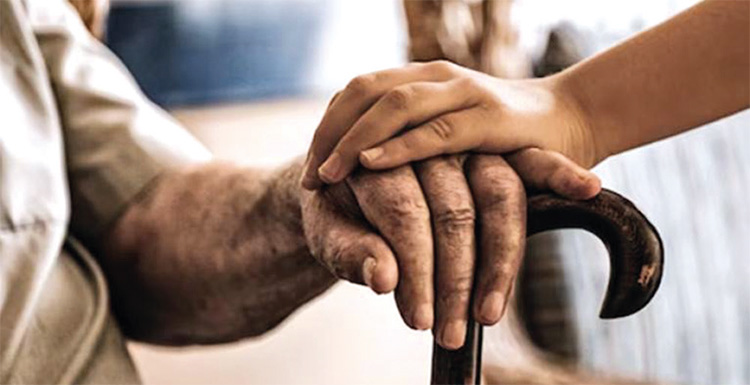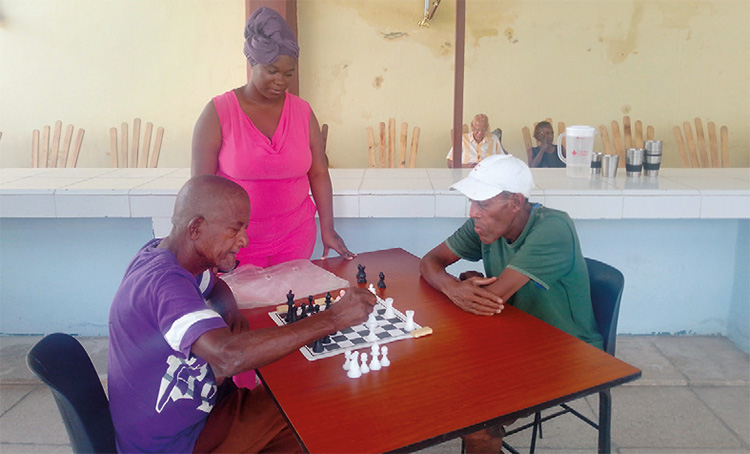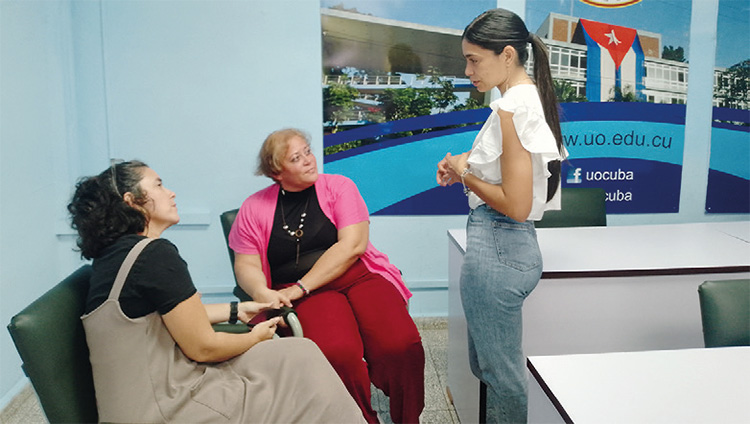A brutal blow to the neck and an avalanche of punches and kicks all over his body opened the door to a different life for Radamés Larrea Aguilera, a native of Santiago de Cuba.

From that early morning, when he was attacked in the middle of the street, his existence went from being an active and vital man to being dependent on a wheelchair; from being a worker to being on the social security payroll with 1,131 pesos; from being a dependent son to his nonagenarian mother, anchored in the universe of those who need to be cared for.
Letisia Novo Santiesteban -a professor at the Universidad de Oriente (UO), and the only child of her parents, one of whom is senile, aggressive, bedridden and incontinent- is torn between what she was and what she is.
Yesterday, she went to the hairdresser, went out with friends, attended events, read books, slept… Today, she cares, cares, cares, and keeps her job thanks to «the infinite and invaluable help of bosses and colleagues».
Neither Radamés nor Letisia have read Decree no. 109/2024 (National System of Comprehensive Life Care), he is not aware of its existence, she has heard «something about it» on the radio, but what they face in their daily lives makes them realize that the reality of the caregiver-caretaker is becoming difficult to cope with.
From Affection and Pocket
Larissa Turtós Carbonell, Master of Science, psychologist by profession and Assistant Professor at the UO, with long experience in research on people receiving and providing care, maintains that «in practice, the impact of this legal norm is not yet appreciated, at least in accordance with what people need and want, also taking into account the time that has elapsed since its approval to date.

But it is undoubtedly a step forward because caregivers have been made visible,» a work that «has to do with love, with filial relationships, even though it’s another job, exhausting, demanding, and almost never paid.»
It recognizes that there are many, especially women, who have to leave their formal jobs to devote themselves to caregiving, a problem that «will tend to increase in line with indicators of population aging and emigration.
Both of these facts trigger another situation that indicates an increase: «The increasing number of older adults caring for other older adults.
According to this professor, the «what» included in the generality of the resolution must have a «how» in other legal bodies, and «disseminate its content more widely, without leaving it to spontaneity».
Specialists from the Provincial Directorate of Labor and Social Security in Santiago de Cuba, together with those from other agencies, are working on it with the leadership of the government in the area.
Seminars and workshops on best practices have been held to socialize the actions, «due to the sensitivity of the task and the need to change ways of doing things,» according to Yanet Aniuska Vichot González, coordinator of programs and objectives of the provincial government.
However, the involvement of entities that articulate action – as is the spirit of the National System for Comprehensive Life Care – must go beyond what is said to what is done.
«How much can the trade union sections, through the collective agreement, do for their members in the role of caregivers?» asks psychologist Turtós Carbonell. «There are certainly gaps that point to a provision that is on the right track, but with very slow progress,» she concludes.
«The training schools for caregivers, installed at the polyclinic level, sometimes do not even work or are not adapted to the routines of the caregivers, with limited schedules and time; people with Down syndrome, who can do many tasks, are hardly employed and end up in their homes as appendages of a caregiver (or vice versa), usually the mother, who usually stops being a paid employee to devote herself to the care of the child.”
Who takes care of whom?
Social and economic dimensions surround the caregiver-recipient binomial. The latter find one of their channels in the Home Social Assistance Service.

«According to Ariel Fonseca Quesada, Vice Minister of Labor and Social Security, who recently spoke on the TV program Mesa Redonda, there are about 14 thousand people in the country hired as such.
The number could be higher, according to the variety of situations that exist, but its increase depends on many factors. Some become a brake, at least this is the feeling of two residents of Santiago who try to benefit from this service and who preferred anonymity to narrate their experiences.
The first, a retired man caring for his only son who was suddenly stricken with cancer and unable to walk; the second, a moonlighting professional caring for a blind and bedridden mother.
Both are now struggling to find the right person to work as an assistant for a monthly salary of 2,810 pesos, and to fill out the many documents required by the municipal social worker to begin the process of getting a paid caregiver approved by the state.
If it is not feasible for this professional to pay out of pocket for someone to take care of her mother, the retiree does not even think about this option, much less turn to a small and medium sized company dedicated to providing this type of service (with rates of 8,000 pesos or more). Their arguments are the same: «there is no pocket for this».
As recognized by experts in Cuba and around the world, having someone at home in need of special care means facing a progressive physical and psychological deterioration, aggravated for the people of this archipelago by the addition of other burdens: lack of food, toiletries, medicines, electricity, transportation…
The dimensions of this reality are well known to the Doctor of Psychological Sciences, Aymara Reyes Saborit, who has dedicated more than 20 years to researching everything related to the care of patients with chronic kidney failure.
In her opinion, the National System for Comprehensive Life Care is still in its infancy.
“We cannot ignore the economic reality that the country is going through, nor needs such as counseling, protective belts for the spine and waist, teaching of good practices for family management, technical aids (wheelchairs and others), disposable cloths, rubber….
Without a doubt, caring for another person is something that is increasingly becoming a reality for hundreds of Cubans. The existence of a decree aimed at improving and facilitating this process is the light at the beginning of the tunnel, but more light is needed along it to reach the end with the full dignity that the caregiver-recipient duo deserves.
Acerca del autor
Periodista cubana. Máster en Ciencias de la Comunicación. Profesora Auxiliar de la Universidad de Oriente. Guionista de radio y televisión.



